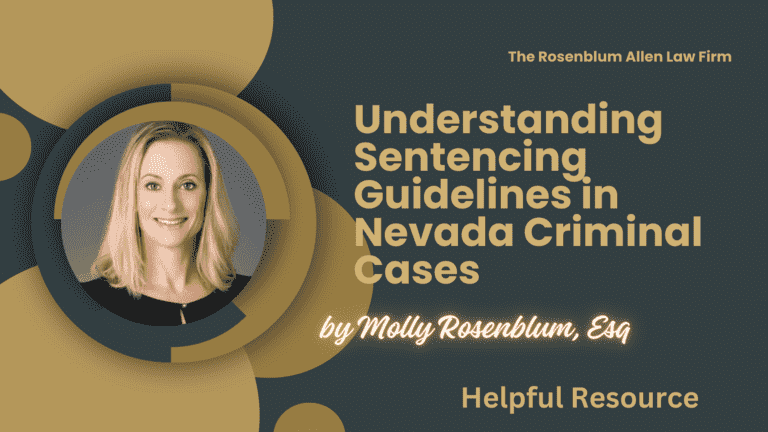Nevada’s sentencing guidelines are a critical framework. Judges use them to determine appropriate sentences for convicted individuals.
These guidelines ensure consistency and fairness in sentencing. They consider the nature of the crime and the defendant’s background.
Understanding these guidelines is vital for anyone involved in the criminal justice system in Nevada. This includes defendants, lawyers, and even concerned family members.

Importance of Understanding Sentencing Guidelines in Nevada
Grasping the nuances of Nevada’s sentencing guidelines is essential. It helps defendants and their legal representatives anticipate potential outcomes. This allows them to plan defenses more effectively and understand the legal landscape they are navigating. This knowledge demystifies legal processes for the general public. It promotes a more informed and engaged citizenry.
Historical Context and Development of Nevada Sentencing Guidelines
Evolution of Sentencing Laws in Nevada
Nevada’s sentencing guidelines have evolved significantly over time. Initially, judges had considerable discretion in sentencing, leading to inconsistencies. Over the years, legislation and legal precedents have shaped a more structured approach. This evolution reflects changes in societal attitudes towards crime and punishment. Efforts continue to balance public safety with fair treatment of defendants.
Influence of Federal and State Laws on Nevada’s Guidelines
Both federal and state laws have influenced Nevada’s sentencing guidelines. Federal sentencing reforms, like the Sentencing Reform Act of 1984, have indirectly impacted state practices. They established broader trends in sentencing philosophy. Nevada’s legislation continuously adapts to address specific state concerns and evolving legal standards.

General Principles of Sentencing in Nevada
Objectives of Sentencing
The primary objectives of sentencing in Nevada include deterring criminal behavior, protecting society, punishing offenders, and offering opportunities for rehabilitation. These goals aim to balance the need for public safety with the rights and potential reform of the convicted individual.
Factors Influencing Sentencing Decisions
When determining sentences, Nevada courts consider various factors:
The severity and circumstances of the offense
The defendant’s criminal history
The impact on victims
Societal norms and legal precedents
Judges weigh these factors to tailor sentences that are just and appropriate to each case. They reflect the complex interplay between individual circumstances and broader legal principles.

Types of Offenses and Their Sentencing Guidelines in Nevada
Misdemeanors: Definition and Sentencing Ranges
Misdemeanors in Nevada are considered less serious crimes but still carry significant consequences. Examples include petty theft, simple assault, and first-time DUI offenses. Sentencing for misdemeanors can range from fines to up to six months in jail. The judge may also impose community service, probation, or other penalties. The decision depends on the specific circumstances of the case.
Gross Misdemeanors: Definition and Sentencing Ranges
Gross misdemeanors in Nevada are a step above misdemeanors. They include offenses like stalking without a weapon or certain repeat DUIs. These carry heftier penalties, often involving jail time of up to one year and more significant fines. Judges can include extra punishments or requirements for misdemeanors. For example, they may need counseling or community service.
Felonies: Classification and Sentencing Ranges
Felonies are the most severe type of crime in Nevada, and they are categorized into five classes, each with its sentencing guidelines:
Category A Felonies
These are the most severe crimes, like murder and kidnapping. Sentences can range from life imprisonment (with or without the possibility of parole) to the death penalty in the most extreme cases.
Category B Felonies
Includes crimes like voluntary manslaughter and armed robbery. The sentencing for these felonies varies widely, typically ranging from one to 20 years in prison.
Category C Felonies
These felonies include involuntary manslaughter and certain drug offenses. Sentences usually range from one to five years in prison.
Category D Felonies
Examples are certain drug offenses and burglary without possession of a firearm. Sentencing ranges from one to four years in prison.
Category E Felonies
The least severe felonies, like some non-violent thefts and low-level fraud, usually result in a one to four-year prison sentence. Often, probation or a suspended sentence is possible.

Specific Guidelines for Common Offenses
DUI (Driving Under the Influence)
Nevada takes DUI offenses seriously. First-time offenders may face fines, license suspension, and mandatory attendance in DUI school. They may also have to attend victim impact panels. Repeat crimes or DUIs involving injury or death carry much harsher penalties, including extended jail time.
Drug-Related Offenses
In Nevada, drug offenses range from possession to trafficking. Penalties vary based on the type and amount of drugs involved. Penalties can include fines, mandatory drug counseling, and imprisonment.
Theft and Burglary
The severity of sentences for theft and burglary depends on the value of the stolen goods and whether the perpetrator was armed. Penalties range from fines and probation for petty theft to several years for armed burglary.
Assault and Battery
Sentences for assault and battery depend on factors like the severity of injury to the victim and whether a weapon was used. Simple assault might result in fines and short jail sentences. Aggravated assault could lead to longer imprisonment.
White-Collar Crimes
These include fraud, embezzlement, and money laundering. Sentences can vary widely, often involving hefty fines and prison time, depending on the amount of money involved and the sophistication of the crime.
Each offense has its own guidelines. The specifics of each case can further influence the defendant’s criminal history and mitigate aggravated circumstances.

Role of Aggravating and Mitigating Factors
Definition and Examples of Aggravating Factors
Aggravating factors are conditions or aspects of a crime that increase its severity. This leads to harsher sentencing. In Nevada, these include using a weapon, having prior convictions, or committing a crime in a particularly heinous, cruel, or depraved manner. For example, if a robbery is committed with a firearm, this would be an aggravating factor. It could lead to a longer prison sentence.
Definition and Examples of Mitigating Factors
Conversely, mitigating factors can reduce the severity of a sentence. These include circumstances like the defendant’s lack of prior criminal history, evidence of remorse, or actions taken to make amends for the crime. For instance, if a defendant voluntarily returns stolen property or compensates the victim, this may be considered a mitigating factor.
How These Factors Affect Sentencing
Judges in Nevada consider these factors to tailor the sentence to the specifics of each case. This process ensures that the punishment fits the crime. It also considers the defendant’s individual circumstances.
Sentencing Enhancements and Reductions
Habitual Criminal Enhancement
Nevada law provides for increased penalties for those deemed ‘habitual criminals.’ This enhancement is applied to individuals with multiple prior felony convictions. It significantly increases the potential prison time for a new felony conviction.
Use of Deadly Weapon Enhancement
If a crime is committed with the use of a deadly weapon, this can significantly increase the sentence. In Nevada, the presence of a gun during a crime, such as a firearm or knife, is taken very seriously and treated as a significant aggravating factor.
Probation and Suspended Sentences
In some cases, Nevada courts may offer probation or suspend the sentence. This especially applies to less severe crimes or first-time offenders. This allows the individual to avoid jail time, provided they adhere to certain conditions. These include regular check-ins, counseling, or community service.
Procedure for Sentencing Hearings in Nevada
Pre-Sentencing Reports
Before sentencing, a pre-sentencing report is often prepared. It gives the judge detailed information about the defendant’s background and the circumstances of the crime. This report includes recommendations for sentencing and plays a crucial role in the judge’s decision-making process.
Role of the Defense and Prosecution
During the sentencing hearing, the defense and prosecution can present arguments, evidence, and mitigating or aggravating factors. The reason may highlight elements that warrant a lighter sentence. The trial might emphasize factors justifying a harsher penalty.
Judge’s Discretion in Sentencing
Ultimately, the judge has discretion in deciding the sentence. They are guided by Nevada’s sentencing guidelines and the specifics presented during the hearing. This decision-making process balances legal standards with the unique elements of each case.
These guide sections highlight the complexity and nuances of sentencing in Nevada. They illustrate how various factors come into play to determine the final sentence for a convicted individual.

Appealing a Sentence in Nevada
Grounds for Appeal
In Nevada, a defendant can appeal their sentence if they believe it was unjust or legally flawed. Grounds for appeal can include legal errors during the trial, such as improper jury instructions, admission of inadmissible evidence, and claims of ineffective assistance of counsel. Defendants need to understand that an appeal is not a new trial but a review of the trial court’s decision for legal mistakes.
The Appeals Process
The appeals process in Nevada involves:
- Submitting a written brief to an appellate court.
- Outlining the alleged errors.
- Arguing why the sentence should be changed.
The prosecution will also submit a brief in response. In some cases, oral arguments may be presented. The appellate court then reviews the case and decides whether to uphold the original sentence, modify it, or potentially order a new trial.
Potential Outcomes of an Appeal
The outcomes of an appeal can vary. In rare cases, the appellate court might uphold the original sentence, reduce the sentence, overturn the conviction (resulting in a new trial), or even dismiss the charges. Appellants must have realistic expectations and understand that appeals often focus on legal technicalities rather than factual disputes.
Impact of Sentencing Guidelines on Recidivism and Rehabilitation
Studies and Statistics on Sentencing Efficacy
Research and studies play a significant role in shaping sentencing guidelines. Studies examining the efficacy of different sentencing approaches in Nevada help determine how best to balance punishment with rehabilitation. Statistics on recidivism rates, for example, are crucial for understanding whether specific sentences effectively deter future crimes or aid in repair.
Rehabilitation Programs and Alternatives to Incarceration
Nevada recognizes the importance of rehabilitation in reducing recidivism. Alternatives to incarceration, such as drug treatment programs, educational opportunities, and community service, are often integrated into sentencing, especially for non-violent offenders. These programs aim to address the underlying issues contributing to criminal behavior, offering a path to reform and reintegration into society.
Why You Have Not Hired a Felony Defense Attorney Yet
Watch this short video to take the next big step toward defending your rights against a felony charge.

Breaking It All Down for You
This guide has covered the intricate landscape of Nevada’s sentencing guidelines, from the types of offenses and their corresponding sentences to the factors influencing these decisions. It has also explored the options for appealing sentences and the impact of these guidelines on recidivism and rehabilitation.
The Importance of Legal Representation in Sentencing
Effective legal representation is crucial throughout the sentencing process. A knowledgeable defense attorney can argue for mitigating factors, navigate the complexities of the law, and potentially secure a more favorable outcome for the defendant.
Future Outlook on Nevada Sentencing Guidelines
As societal attitudes and legal perspectives evolve, so will Nevada’s sentencing guidelines. Ongoing legal reforms and studies will likely continue to shape these guidelines, aiming for a justice system that is fair, equitable, and effective in reducing crime.
This comprehensive exploration of Nevada’s sentencing guidelines provides valuable insight for anyone involved in the legal system, offering a clearer understanding of the multifaceted process of sentencing in the state.

Frequently Asked Questions
What is the difference between probation and a suspended sentence in Nevada?
Probation is a sentence where the offender remains in the community under supervision. There are specific conditions that must be met. A suspended sentence is a prison sentence that is delayed. The defendant completes a probation period. If the probation is violated, the suspended sentence can be activated.
Can a misdemeanor in Nevada be upgraded to a felony?
Yes, under certain circumstances. For example, repeated offenses of the same misdemeanor or the involvement of aggravating factors, such as serious injury to another person, can lead to a misdemeanor being reclassified as a felony.
Are there mandatory minimum sentences for any crimes in Nevada?
Yes, Nevada has mandatory minimum sentences for certain offenses. These include violent crimes and serious drug offenses. These mandatory minimums set the minimum prison time a judge must impose for specific crimes.
How does Nevada address juvenile offenders in its sentencing guidelines?
The juvenile justice system typically handles juvenile offenders. It emphasizes rehabilitation over punishment. Sentencing guidelines for juveniles focus on educational and community-based programs. Yet, more severe offenses may result in incarceration in juvenile facilities.
Does Nevada offer diversion programs for first-time offenders?
Yes, Nevada has diversion programs. They offer first-time, non-violent offenders an alternative to traditional sentencing. These programs often include counseling, community service, and other rehabilitative measures. Successful completion can lead to the charges being dropped or reduced.
Can victims impact the sentencing decision in Nevada?
Victim impact statements can play a role in the sentencing process in Nevada. Victims or their families can present reports during sentencing hearings. Judges may consider these reports when determining the appropriate sentence.
Is community service often used as a sentence in Nevada?
Community service can be used in sentencing for certain offenses. It’s especially common in cases involving non-violent or first-time offenders. It’s often seen as a way to give back to the community while serving as a rehabilitative measure for the offender.
How is a ‘habitual criminal’ determined in Nevada?
In Nevada, a habitual criminal is a person convicted of multiple felonies, showing a pattern of criminal behavior. The specific criteria can include the number of prior convictions and the nature of those offenses.
What are the rights of a defendant during the sentencing phase?
A defendant has the right to be represented by an attorney. They can also present evidence and argue for a lesser sentence. They can appeal the ruling if they believe it was unjust or legally flawed. They also have the right to make a statement on their behalf during the sentencing hearing.
Can sentences in Nevada be modified after they are imposed?
Yes, under certain circumstances. Modifications can occur through an appeal process. In some cases, a motion for sentence modification can be filed with the original sentencing court. This is typically based on new evidence or changes in the defendant’s circumstances.

Glossary
Aggravating Factors: Conditions or aspects of a crime that increase its severity and can lead to harsher sentencing. Examples include the use of a weapon, prior convictions, or ruthlessly committing a crime.
Appeals Process: The legal procedure by which a convicted person can challenge the legality of their sentencing in a higher court. This process involves reviewing the original trial’s proceedings for legal errors.
Category A Felony: The most severe class of felonies in Nevada, which includes crimes such as murder and kidnapping, often resulting in life imprisonment or the death penalty.
Category B, C, D, E Felonies: Lesser felonies in Nevada, each with varying severity and corresponding sentencing ranges. These include crimes like voluntary manslaughter, certain drug offenses, and non-violent theft.
Community Service: A form of punishment where the offender performs unpaid work for the community as part of their sentence, often used for non-violent or first-time offenders.
Diversion Programs: Programs that offer first-time, non-violent offenders an alternative to traditional sentencing. These often involve rehabilitation efforts like counseling and community service.
Gross Misdemeanor: A more severe form of misdemeanor in Nevada, including crimes like stalking without a weapon, punishable by up to one year in jail and more significant fines.
Habitual Criminal: A legal designation in Nevada for individuals with multiple prior felony convictions, leading to enhanced sentencing for new offenses.
Juvenile Justice System: The legal system deals with crimes committed by individuals under 18, focusing more on rehabilitation than punishment.
Mandatory Minimum Sentences: Legally prescribed minimum imprisonment lengths for certain offenses, limiting judges’ discretion in sentencing.
Misdemeanor: Less severe crimes in Nevada, punishable by fines and up to six months in jail. Examples include petty theft and simple assault.
Mitigating Factors: Conditions or aspects of a defendant’s situation or the circumstances of the crime that can lessen the severity of the sentence. Examples include lack of prior criminal history, evidence of remorse, or restitution to the victim.
Pre-Sentencing Reports: Reports are prepared to provide the sentencing judge with detailed information about the defendant’s background and the crime’s circumstances, including sentencing recommendations.
Probation: A sentence where the offender is allowed to remain in the community under supervision instead of serving time in jail, with specific conditions that must be met.
Recidivism: The tendency of a convicted criminal to reoffend. Sentencing guidelines and rehabilitation programs aim to reduce recidivism rates.
Sentencing Enhancements: Legal provisions that increase the severity of a sentence based on specific factors, such as the use of a deadly weapon or the defendant’s status as a habitual criminal.
Suspended Sentence: A prison sentence is delayed while the defendant completes probation. If the probation is violated, the suspended sentence can be activated.
Victim Impact Statement: A statement made by the victim or their family during the sentencing phase of a trial describing the impact of the crime on their lives. Judges may consider these statements when determining the sentence.
Additional Resources for You

Our lead attorney, Molly Rosenblum Allen, Esq., has not only been a pillar of legal expertise but has also created a wealth of resources designed to guide you in times of legal uncertainty. These resources cover a range of crucial legal topics and are invaluable for anyone seeking clarity and understanding in the complex world of law. Here are some of the comprehensive guides and articles authored by Molly Rosenblum Allen, Esq.:
Double Jeopardy: Dive deep into the intricacies of Double Jeopardy, understanding its legal implications and protections. Explore this resource here.
Hung Jury: Gain insights into what a hung jury means in the legal system and its potential impact on a trial. Read more here.
Circumstantial Evidence: Unravel the nuances of circumstantial evidence and how it can influence the outcome of legal proceedings. Learn more here.
Indicted vs Charged: Clarify the differences between being indicted and charged, and understand the legal process involved in each. Detailed information available here.
Difference Between Jail and Prison: Understand the distinct differences between jail and prison, a common confusion in the legal field. This guide is available here.
What are Miranda Rights: Get a comprehensive understanding of Miranda Rights and their critical importance in the legal process. Further details can be found here.
How to Check if You Have an Outstanding Warrant: Navigate the steps and procedures to check for any outstanding warrants in your name. Start your search here.
What to Look for in a Criminal Defense Lawyer: Arm yourself with knowledge about the key qualities to look for when selecting a criminal defense lawyer. Guidance is provided here.
Possible Ways to Reduce a Felony Charge: Explore the strategies and legal avenues that might be available to reduce a felony charge. Learn about your options here.
Should You Accept a Plea Bargain: Deliberate the pros and cons of accepting a plea bargain, an essential decision in many legal cases. Find out more here.
Each of these resources has been meticulously crafted to offer clarity, direction, and support. We encourage you to explore these guides to empower yourself with knowledge and to navigate the legal landscape more confidently.

Offsite Resources You May Find Helpful
Here is a list of seven resources where you can find information related to Nevada Sentencing Guidelines:
Nevada Legislature: This is the official site for Nevada’s legislative information, where you can find the most current laws and bills, which include sentencing guidelines.
Visit Nevada LegislatureNevada Judiciary: The official website of the Nevada Judiciary provides resources, opinions, and court-related information, which may include aspects of sentencing guidelines applied by the courts.
Visit Nevada JudiciaryNevada Department of Corrections: This site offers information on correctional facilities and the management of offenders in Nevada, which can give insights into how sentencing guidelines are implemented post-trial.
Visit Nevada Department of CorrectionsNevada Attorney General: The Attorney General’s Office often deals with legal matters pertaining to the state, including criminal justice and, by extension, sentencing guidelines.
Visit Nevada Attorney GeneralClark County District Attorney: For more localized information, especially pertinent to the Las Vegas area and surrounding regions, the District Attorney’s office in Clark County can provide resources and information on prosecution and sentencing.
Visit Clark County District AttorneyWashoe County District Attorney: Similar to Clark County, Washoe County’s District Attorney’s website can provide insights into sentencing guidelines as they apply within that jurisdiction.
Visit Washoe County District AttorneyState Bar of Nevada: The State Bar offers various legal resources, including access to publications and articles that might discuss sentencing guidelines or changes in criminal law.
Visit State Bar of Nevada

A Special Message From Our Lead Attorney
Why You Might Need a Lawyer

Molly Rosenblum, Esq
Dear Reader,
Thank you so much for taking the time to explore the resources on Nevada sentencing guidelines. We understand that navigating the legal landscape can be complex, and we hope the information provided has been informative and helpful.
If you have any further questions or if you find yourself in need of guidance tailored to your specific situation, we encourage you to reach out. We are pleased to offer a free consultation to discuss your requirements in more detail.
Please don’t hesitate to call us at (702) 433-2889 to schedule your appointment. Our dedicated team is here to assist you with expertise and compassion.
Warm regards,
Molly





